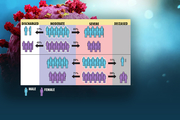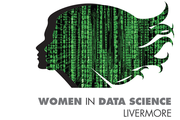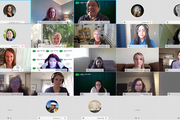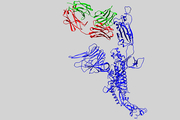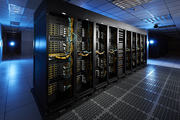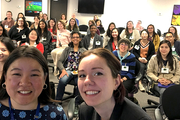Did you know we have a monthly newsletter? View past volumes and subscribe.
LLNL team models COVID-19 disease progression and identifies risk factors
Feb. 15, 2022 -
An LLNL team has developed a comprehensive dynamic model of COVID-19 disease progression in hospitalized patients, finding that risk factors for complications from the disease are dependent on the patient’s disease state. Using a machine learning algorithm on a dataset of electronic health records from more than 1,300 hospitalized COVID-19 patients with ProMedica — the largest health care...
WiDS Livermore returns on March 7
Feb. 10, 2022 -
We are hosting our 5th WiDS Livermore regional event to encourage our community of women in computing. We will watch the WiDS Stanford Livestream as well as feature Lab-focused technical talks, mentoring breakout sessions, and a career panel.
WiDS Livermore is an independent event hosted by LLNL Ambassadors as part of the annual Women in Data Science (WiDS) Worldwide conference organized by...
Unprecedented multiscale model of protein behavior linked to cancer-causing mutations
Jan. 10, 2022 -
LLNL researchers and a multi-institutional team have developed a highly detailed, machine learning–backed multiscale model revealing the importance of lipids to the signaling dynamics of RAS, a family of proteins whose mutations are linked to numerous cancers. Published by the Proceedings of the National Academy of Sciences, the paper details the methodology behind the Multiscale Machine...
LLNL establishes AI Innovation Incubator to advance artificial intelligence for applied science
Dec. 20, 2021 -
LLNL has established the AI Innovation Incubator (AI3), a collaborative hub aimed at uniting experts in artificial intelligence (AI) from LLNL, industry and academia to advance AI for large-scale scientific and commercial applications. LLNL has entered into a new memoranda of understanding with Google, IBM and NVIDIA, with plans to use the incubator to facilitate discussions and form future...
LLNL joins Human Vaccines Project to accelerate vaccine development and understanding of immune response
Oct. 21, 2021 -
LLNL has joined the international Human Vaccines Project (HVP), bringing Lab expertise and computing resources to the consortium to aid development of a universal coronavirus vaccine and improve understanding of immune response. The HVP is a nonprofit, public-private partnership with a mission to decode the human immune system and accelerate the development of vaccines and immunotherapies...
Tackling the COVID-19 pandemic
Oct. 11, 2021 -
To help the U.S. fight the COVID-19 pandemic, LLNL did what it does best: quickly bring together interdisciplinary teams and diverse technologies to address urgent national challenges. This effort includes applying advanced high-performance computing resources to biological research and anayzing complicated computer models and enormous datasets. Read more in Science & Technology Review.
Career panel series kicks off with women in Computing leadership roles
July 6, 2021 -
More than 100 LLNL staff and students gathered virtually for the first session of a new career panel series inspired by the annual WiDS conference and sponsored by the DSI. Panelists discussed how they have shaped their careers at the Lab and in Computing, their journeys into leadership roles, and how they navigate career challenges. Data scientist and panel series organizer Cindy Gonzales...
COVID-19 detection and analysis with Nisha Mulakken (VIDEO)
June 7, 2021 -
LLNL biostatistician Nisha Mulakken has enhanced the Lawrence Livermore Microbial Detection Array (LLMDA) system with detection capability for all variants of SARS-CoV-2. The technology detects a broad range of organisms—viruses, bacteria, archaea, protozoa, and fungi—and has demonstrated novel species identification for human health, animal health, biodefense, and environmental sampling...
COVID-19 HPC Consortium reflects on past year
April 1, 2021 -
COVID-19 HPC Consortium scientists and stakeholders met virtually on March 23 to mark the consortium’s one-year anniversary, discussing the progress of research projects and the need to pursue a broader organization to mobilize supercomputing access for future crises. The White House announced the launch of the public-private consortium, which provides COVID-19 researchers with free access to...
Lab event encourages growth of women in data science
March 17, 2021 -
Coinciding with International Women’s Day on March 8, LLNL’s 4th Women in Data Science (WiDS) regional event brought women together to discuss successes, opportunities and challenges of being female in a mostly male field. The Lab’s first-ever virtual WiDS gathering attracted dozens of LLNL data scientists as well as some from outside the Lab, and featured speakers, a career panel and...
Lab researchers explore ‘learn-by-calibration’ approach to deep learning to accurately emulate scientific process
Feb. 10, 2021 -
An LLNL team has developed a “Learn-by-Calibrating” method for creating powerful scientific emulators that could be used as proxies for far more computationally intensive simulators. Researchers found the approach results in high-quality predictive models that are closer to real-world data and better calibrated than previous state-of-the-art methods. The LbC approach is based on interval...
Model for COVID-19 drug discovery a Gordon Bell finalist
Nov. 17, 2020 -
A machine learning model developed by a team of LLNL scientists to aid in COVID-19 drug discovery efforts is a finalist for the Gordon Bell Special Prize for High Performance Computing-Based COVID-19 Research. Using Sierra, the world’s third fastest supercomputer, LLNL scientists produced a more accurate and efficient generative model to enable COVID-19 researchers to produce novel compounds...
Advancing healthcare with data science (VIDEO)
Aug. 3, 2020 -
This video provides an overview of projects in which data scientists work with domain scientists to address major challenges in healthcare. To help fight the COVID-19 pandemic, researchers are developing computer models to search for potential antibody and antiviral drug treatments, sharing a data portal with scientists and the general public, and analyzing drug compounds via a novel text...
Lab team studies calibrated AI and deep learning models to more reliably diagnose and treat disease
May 29, 2020 -
A team led by LLNL computer scientist Jay Thiagarajan has developed a new approach for improving the reliability of artificial intelligence and deep learning-based models used for critical applications, such as health care. Thiagarajan recently applied the method to study chest X-ray images of patients diagnosed with COVID-19, arising due to the novel SARS-Cov-2 coronavirus. Read more at LLNL...
COVID-19 research goes public through new portal
May 18, 2020 -
A new online data portal is making available to the public a wealth of data LLNL scientists have gathered from their ongoing COVID-19 molecular design projects, particularly the computer-based “virtual” screening of small molecules and designed antibodies for interactions with the SARS-CoV-2 virus for drug design purposes. The portal houses a wealth of data LLNL scientists have gathered from...
Interpretable AI in healthcare (PODCAST)
May 17, 2020 -
LLNL's Jay Thiagarajan joins the Data Skeptic podcast to discuss his recent paper "Calibrating Healthcare AI: Towards Reliable and Interpretable Deep Predictive Models." The episode runs 35:50. Listen at Data Skeptic.
The incorporation of machine learning into scientific simulations at LLNL (VIDEO)
May 5, 2020 -
In this video from the Stanford HPC Conference, Katie Lewis presents "The Incorporation of Machine Learning into Scientific Simulations at Lawrence Livermore National Laboratory." Read more and watch the video at insideHPC.
New ML platform generates novel COVID-19 antibody sequences for experimental testing
May 1, 2020 -
LLNL researchers have identified an initial set of therapeutic antibody sequences, designed in a few weeks using machine learning and supercomputing, aimed at binding and neutralizing SARS-CoV-2, the virus that causes COVID-19. The research team is performing experimental testing on the chosen antibody designs. Read more at LLNL News.
Upgrades for LLNL supercomputer from AMD, Penguin Computing aid COVID-19 research
April 21, 2020 -
Under a new agreement, AMD will supply upgraded graphics accelerators for LLNL’s Corona supercomputing cluster, expected to nearly double the system’s peak compute power. The system will be used by scientists through the public/private COVID-19 HPC Consortium, and by LLNL researchers, who are working on discovering potential antibodies and anti-viral compounds for SARS-CoV-2, the virus that...
Lab promotes diversity, tech at Women in Data Science regional event
April 3, 2020 -
For the third consecutive year, Lawrence Livermore National Laboratory (LLNL) hosted a Women in Data Science (WiDS) regional event on March 2. Held at the HPC Innovation Center, the event drew dozens of attendees from LLNL, Sandia National Laboratories, local universities, and Bay Area commercial companies.
Livermore was one of over 200 regional events in 60 countries coordinated with the...

